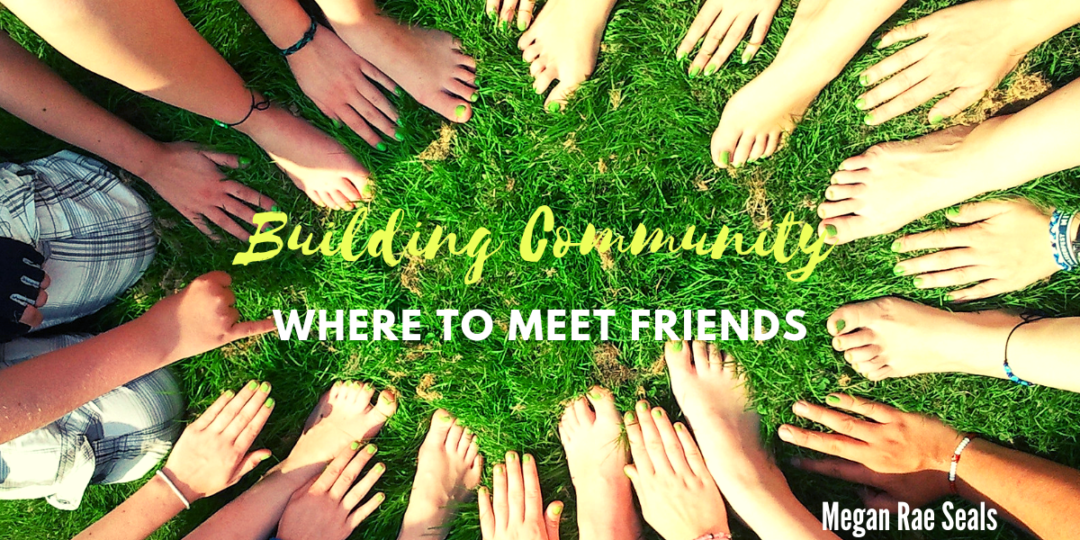
Trying to build community in an urban or transient area can be tricky, particularly if you grew up in a small town where community is something that just sort of happens around you. The first seventeen years of my life were spent in the small town of Big Stone Gap, which is nestled in the Appalachian mountains and is exactly how it sounds. It’s not the kind of place where everybody knows your name. Rather, it’s the kind of place where everybody knows your name, your mammaw’s name, and the name of your cousin’s neighbor’s ex-boyfriend’s dog. Many of my teachers either taught my family members or went to school with them and can tell you exactly what my dad did in second grade to warrant a paddling. Every Friday night, you knew that you would see 85% of the town at Bullitt Park for the high school football game, and there was never a question as to which fireworks you would attend for Fourth of July.
Shortly after college, all of that changed. I found myself with a new teaching position in Northern Virginia, which is the quintessential opposite of a small town. With sprawling suburbs that continue to creep farther and farther away from Washington, D.C., the DMV metro area is known for its dense population, bottle-neck traffic, and crisp efficiency. You can easily go to the grocery store with no makeup on and not worry about running into someone you know and we’re much too busy to be bothered with small-talk in the pharmacy line. You learn very quickly to never make the rookie mistake of standing on the left side of the escalator, because that side is for walking. Drive-thrus are so efficient, that if you stop for chatter or a “pay-it-forward” moment you will ruin their entire flow, thus causing a traffic jam for hours. It takes a literal natural disaster (I’m looking at you, earthquake of 2011) for you to come outside at the same time as your neighbors and actually introduce yourself, because most of us spend all of our lives commuting in the most ridiculous traffic on the planet. People are motivated, goal oriented, and often experts in their field. Government jobs, military, and business bring people to and from this city frequently, which leads to the feeling of unstable friendships. It’s amazing in a lot of ways, but the pace and congestion make it challenging to cultivate community, which, like it or not, human beings were designed for.
Even if you aren’t new to an area, let’s just all agree that adult friendships are hard. When we’re no longer being shuffled through the cattle-like school system and are finally left to our own devices, we realize how awkward it is to make friends. Who makes the first move? Should we text immediately after the first “date” or wait three days? I’ve seen many friendship groups formed once women have their own children, and they form alliances with other moms. However, what does that mean for those of us who don’t have children or a spouse? Should I invite my neighbor over to watch Handmaid’s Tale or will they think I’m a sociopath? It’s all very confusing.
If you’ve left the comfort of familiar ground for a new city, cultivating community can feel rather intimidating and takes more time than we’d like. You’ll need to be intentional and patient. I thought it might be worthwhile to explore this concept in a blog series with you.
So let’s begin with where. Where does one meet new friends? Technically, in an urban area our housing is so jampacked that it’s hard to go anywhere and not see other humans. You’d think that would make this easier. But we’re just so busy we don’t see each other. Let’s look at a few places where it might be socially acceptable to strike up a conversation and shop for friends.
Places To Find Your People
- Work – This was the most obvious starting point for me. Chances are that if you have chosen the same profession, there is a high probability that you will have something in common with at least one other soul in your workplace. As an elementary school teacher, we bonded almost immediately and commiserated over the children, the county policies, our failing diets amidst kid snacks, and the Bachelorette. Teachers are very relational, so it felt easy to make friends in that space. However, not all of you work in such social settings. When I left the classroom to work in a church, I found this more challenging. The church staff was comprised of very different roles and personalities. Another potential barrier in developing friendships at work is the need for professional boundaries. Friendships can make things challenging when there is a hierarchy in place. Also keep in mind, there are some people who will not be open to friendships with coworkers because they prefer separation between work and home. Don’t take it personally, but this could also explain why some co-workers aren’t the friendliest (or maybe they’re just jerks). There may be challenges in this arena, but the reality is, you spend most of your waking hours in this setting, so keep an open mind to friendships with coworkers. If your company has any social events or group happy hours, resist the urge to stay behind and get one more thing done. Ask your husband to handle child-care pickup this one time. This might be an opportunity to connect with others.
- Church – Church people are all about community, so this is another great place to look for friendships. There are certain affinity groups based on life stages (i.e. young adults group, MOPS, retirement, etc.) This works for some people, but for me, it did not. That isn’t the only way and those might not be your people. For me, I found I was able to better connect to people in either a ministry (such as a worship team or choir), a small group, or a regularly occurring volunteer opportunity. Most churches have a wide variety of activities you can volunteer for – mentoring young kids, leading a middle or high school group, serving breakfast at homeless shelters, funeral ministry, teaching English to immigrants, etc. Also, I enjoyed finding a few different small group studies to join – some were shorter and some were longer. The time put in seemed to correspond to how deeply we were able to get to know one another. Sometimes things clicked and sometimes they didn’t, but with anything, give it time.
- Book Clubs – Yes I am a giant nerd, but book clubs provide a nice, intimate space for chatting. Check your local library or coffee shop for fliers or search online through meetup groups. Chances are you will find something. Bounce around until you find the right nerd group that fits for you, or dare I say, start your own. If you live in an apartment complex, try posting fliers in your community forum and see if you can lure neighbors with the promise of beverages, cheese, and dessert. Not creepy at all.
- Gyms/Studios – I highly doubt you’re going to build deep connections in a generic, big-box gym setting. However, over the last ten years we’ve seen a spike in niche exercise communities. Pure Barre, Soul Cycle, CrossFit, Bikram Yoga, UFC Gym – pick your poison of choice. For those of you who played sports growing up, you know that there is a special kind of bonding that occurs when you’re all being tortured collectively. If money is an issue (same, girl, same) then there are other options. Form a running club in your neighborhood with other moms or with young professionals before the work grind begins. Most communities have a way to communicate, so post something through your HOA, Facebook group, or community bulletin board. You can even try starting an accountability exercise group at work. (I’ve done this in both of my professional settings. It works and you don’t have to drive anywhere. Double bonus.)
- Pick up a Hobby – What are some things you’ve wanted to try? The beauty of living in an urban area is that we have lots of opportunities to try new adventurous hobbies. Painting, sculpture, dance, photography, hiking, fencing, Muay Thai, baking, coding, video games, hang gliding, paddle boarding, etc. You name it, there is probably a group or class for it. Have you always wanted to learn Spanish? Take a 12-week course and maybe over time you’ll connect with someone. Give it a minute, though. You can’t expect a friendship to form in one class.
- Apps & Online Groups – Yes, the girl who wrote about the horrors of online dating (see the article here) is telling you technology isn’t all bad. In fact, you can find some apps to help you meet other friends. Meetup is a great resource that will help you find different groups based on interest. I’ve been on a few meetups, and I didn’t find my soul mate or soul sister there. However, if you’re alone and looking for friends to do things with, this is a great place to find that. There is a group for literally everything you can think of and then some that are so bizarre I would have never thought of them. Bumble has also launched “Bumble BFF.” As a disclaimer, I have not yet tried this. However, I have a friend who uses it and has had success finding hiking partners. I’m now thinking there might be a future blog post about this, because I kind of want to see what happens. Hopefully it won’t be too murdery. I’ll let you know. I also have friends who have connected with other moms through forums or online exercise communities. Stop scrolling Instagram and try using that phone for something worthwhile.
- Recovery Groups – There is something beautiful about being in a room with others dedicating their time to being a healthier version of themselves. If you or a loved one have any sort of hurt, habit, or hang-up, there is a recovery group for you. It is really helpful to find others that are on a similar journey to you. Divorce Care and Celebrate Recovery both exist in many churches. In addition, there about fourteen gazillion twelve-step groups out there that are completely free. Click here for a list of different types of recovery groups.
Cultivating community takes work and intentionality, but it is a beautiful thing. God desires community for each one of us and has created us to work better in connection with others. Join me next time as we continue to explore this concept of adult friendships, how to make them, and how to surround yourself with the right people.



